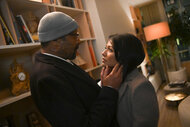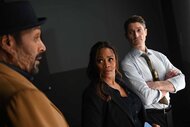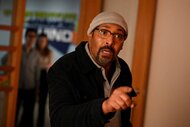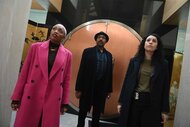Jesse L. Martin's Character on The Irrational Is Haunted by Tragic Crime — Is It Based on Real Case?
The Irrational's Alec Mercer uses behavioral science to bring down criminals, but the college professor is haunted by his inability to solve his most personal case.
The Irrational’s Alec Mercer may effortlessly use behavioral science to bring down powerful criminals, but the college professor is still visibly haunted by his own traumatic past.
Mercer, portrayed by Jesse L. Martin in the new NBC drama, was injured in a church bombing about 20 years earlier that killed 13 people and left him with burns over 60 percent of his body.
But was the deadly bombing based on a real case?
The short answer is no. The bombing is not based on any one specific event, but is representative of past violence targeting churches across America in recent decades.
How Was Alec Mercer Injured in The Irrational?
What we do know so far about the deadly bombing in The Irrational is that Mercer was injured in what was legally considered a “hate crime” at the predominantly Black church nearly two decades earlier.
RELATED: How to Tell If Someone Is Lying, Just Like Jesse L. Martin in The Irrational
“The suspected lone wolf attacker was convicted of two counts of federal hate crimes for possessing explosives and building the bomb that killed 13 people,” Mercer read from a newspaper article that covered the violence.
Mercer was the sole victim to survive the deadly blast and spent years recovering from his injuries.
“For the better part of three years, I was in the hospital with my body covered in bandages that were changed every day,” he told a group of students at Wylton University where he teaches psychology. “It was, as you can imagine, very painful.”
But the injuries and scarring to his face and body aren’t the only long-lasting impacts of the trauma. As the sole survivor, Mercer is haunted by his inability to remember everything about the bombing.
When Wes Banning, the man convicted of building the bomb, purposefully tanked his parole hearing after seeing a shadowy figure in the doorway, Mercer begins to suspect Banning didn’t act alone and dives deeper into the recesses of his mind to uncover new clues.
“I can still hear the blast, I can still smell the explosives, I can still feel the searing, scorching pain of fire on my skin, but I can’t recall a single damn thing about the bomber,” he confided to a support group while working a separate case.
Was the bombing in The Irrational based on a real case?
It’s still unclear whether Mercer and his FBI agent-ex Marisa will be able to put the pieces of the fictional bombing together, but the violence captured in the show, unfortunately, emulates some tragic real-life events.
Four young girls were killed on September 15, 1963 when a bomb tore through the 16th Street Baptist Church in Birmingham, Alabama, according to the FBI. The four victims, along with one young girl who survived, had been in the church basement at the time getting ready for Sunday services.
It’s believed the building was likely targeted because of the role it served in the civil rights movement. The predominantly Black church was often used as a meeting place for leaders like Rev. Martin Luther King Jr. and other key figures in the civil rights movement.
Robert “Dynamite” Chambliss was convicted in connection to the bombing in 1977, but it would take several more decades before others were brought to justice.
Tommy Blanton was convicted on state murder charges in 2001 and Bobby Cherry, a known Ku Klux Klan member, was sentenced to life in prison the following year for being a co-conspirator in the crime.
In the ‘90s there were also a series of fires targeting Black churches. In 1996, for example, four churches were set on fire in Louisiana on the anniversary of a sit-in in Greensboro, North Carolina, according to The New York Times. Just one year earlier, four members of the Ku Klux Klan were linked to another fire at Mount Zion A.M.E. Church in Greeleyville, South Carolina.
The violence didn’t end there. On June 17, 2015, Dylann Roof, an admitted white supremicist, coldly spent 45 minutes attending a bible study at Emanuel African Methodist Episcopal Church in Charleston, South Carolina before opening fire on the parishioners during a final prayer, killing nine of them, according to court records obtained by NBC News.
"Parishioners dove under tables to hide. Roof continued shooting, reloading multiple times,” the documents revealed. “After firing approximately 74 rounds, Roof reached one parishioner who was praying aloud. He told her to 'shut up' and then asked if he had shot her yet."
He decided to leave the woman alive so that she could “tell the story.”
Roof was later convicted and sentenced to the death penalty for the disturbing violence.
While The Irrational is a fictional show, the tragic crime that haunts Alec Mercer is sadly similar to other real-life acts of violence.



































